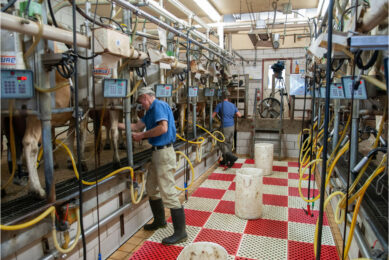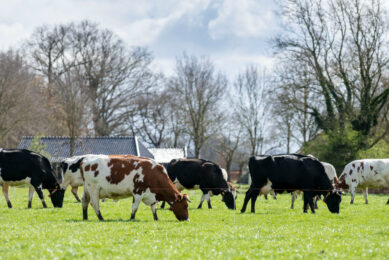British dairy coop in deep trouble

First Milk, the only large cooperative of dairy farmers in the United Kingdom, seems to be at the brink of collapse. Despite heavy restructuring and despite significant lower payments for its farmers and members, First Milk is still loss-making, leading to doubts as to whether the company can survive as a going concern.
First Milk recently announced pre-tax losses of £24.9 million (€35.53 mln) for the financial year till March 31, 2015, far worse than the loss of £4.3 million (€6.14 mln) in the previous financial year. Group turnover was £442.2 million (€630.95 mln) compared to £610.5 million (€871.08 mln) a year earlier. The slide in turnover was mainly due to the collapse of the prices on the global dairy market, the company says. In recent months, First Milk has still been in the red although losses are less than before.
Milk checks postponed
At the beginning of 2015, the financial position was so dire that First Milk had to postpone the milk cheque for its members for 2 weeks. Because all subsequent payments were also delayed, the farmers never got paid for the milk they supplied in those 2 weeks. The coop also announced a compulsory increase of the capital members have to invest in the business from 5 pence per litre to 7 ppl (€0.07). Subsequently, it lowered the price it pays its members for their milk several times, resulting in by far the lowest milk price in the country. First Milk also introduced a so-called B-price for 20% of the milk supplied and a pricing mechanism based on the end product, thus abandoning the cooperative principle that all members receive the same price. As a result, most members of the coop now receive far less than the production costs for their milk.
Improvement necessary
Furthermore, the Board decided to delay all capital repayments (including all instalments of capital repayments) by one year and to then split each capital repayment, so that it is paid out over three years. Despite all those interventions, the situation has hardly improved. Therefore, the company sacked its much-criticized CEO Kate Allen. At the last General Assemblee, Chairman of the Board Sir Jim Paice, a former minister for agriculture in the British government, also stepped down. Mullin has been replaced by Mick Gallagher, who brought a lot of commercial experience from his former employer, Mars and Mars Petcare. Gallagher and his team started to work straight away on a severe restructuring program. All in all, dozens of employees have lost their job, particularly at the head office near Glasgow, Scotland. Moreover, milk producers are leaving the cooperative in droves. Although the company doesn’t give any details, according to experts, First Milk currently has just over 1,200 members, some 600 less than 2 years ago.
Murphy’s law
Already in deep trouble, the company seems to be hit by Murphy’s law. In March 2014, First Milk lost a key contract from a major supermarket on short notice. Later that year, a whey processing facility broke down leading to a bill of over £1 million (€1.43 mln). In the annual report, it also mentions a quality issue with cheese, which was partially attributable to the high level of throughput at the creameries. In the same week of the publication of the annual report, it was announced that sports drink subsidiary CNP lost its major customer, the famous European cycle team Team Sky, and all the publicity with it. The underperformance of CNP, which First Milk only bought in 2012, resulted in an impairment charge of £1.2 million (€1.71 mln).
Banks
The future of the company now appears to be in the hands of its banks. Current banking arrangements run out in February 2016 and it’s far from certain whether the banks will agree an extension. That uncertainty leads the directors to warn that the future of the company as a going concern is not secured. In the Annual Report, they write: “The directors have concluded that the dependency upon the continued support of the bank from the date of these financial statements, the risk of not obtaining adequate banking facilities beyond February 2016 and the risk of not achieving the forecast performance, represent the existence of material uncertainties that may cast significant doubt upon the Group’s ability to continue as a going concern. This may mean that the Group is unable to continue to realise its assets and discharge its liabilities in the normal course of business.”
Join 13,000+ subscribers
Subscribe to our newsletter to stay updated about all the need-to-know content in the dairy sector, two times a week.










